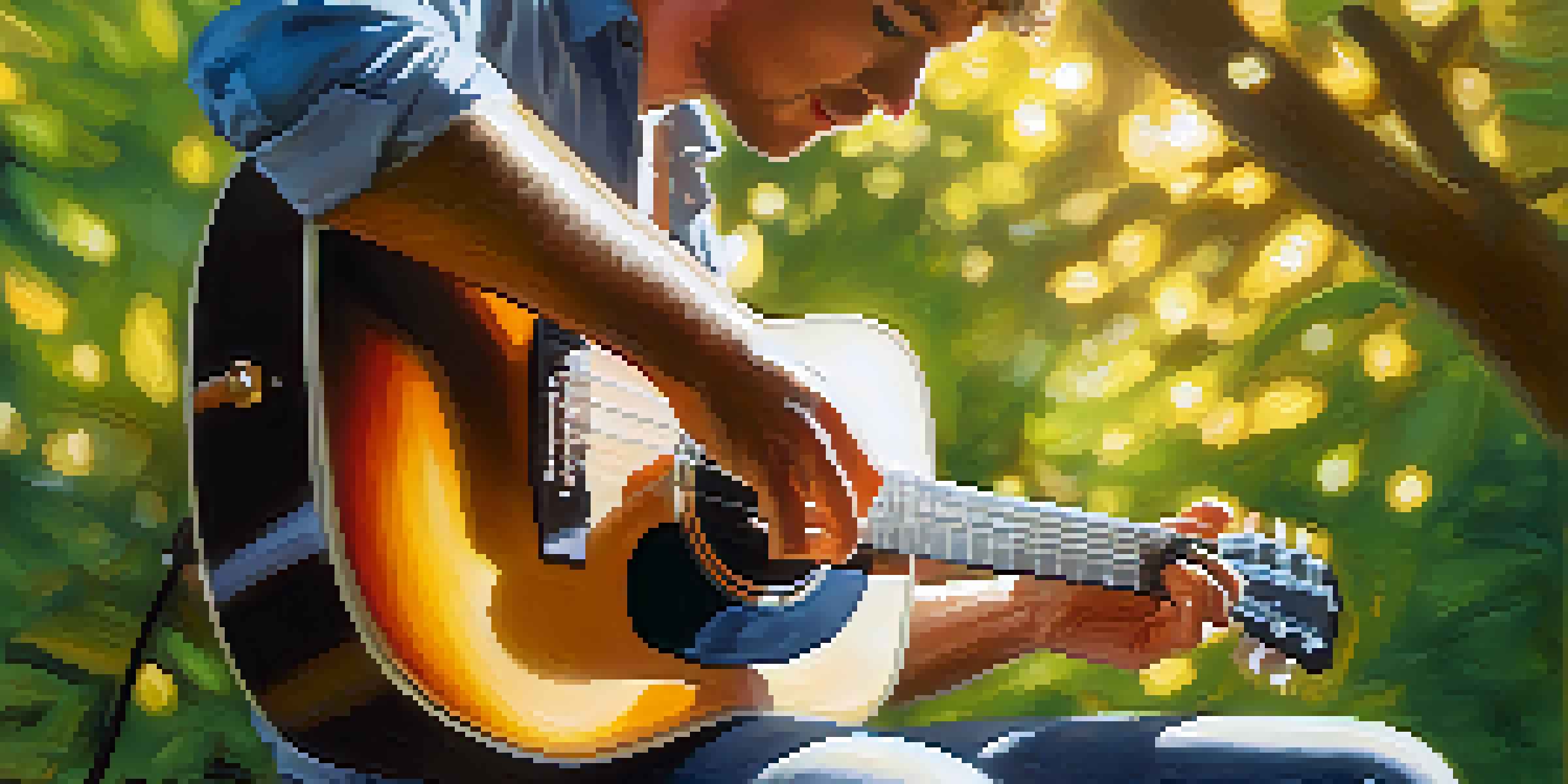The Connection Between Guitar Playing and Emotional Release

Understanding Emotional Expression Through Music
Music has always been a universal language, and guitar playing is no exception. Through strumming and picking, guitarists express feelings that words often can't capture. It's like painting with sound, where each chord conveys a different emotion.
Music can change the world because it can change people.
When you pick up a guitar, it becomes an extension of your feelings. Whether you're feeling joyful, sad, or frustrated, the guitar can mirror those emotions, allowing you to channel them in a creative way. This emotional expression is not only cathartic but can also lead to deeper self-understanding.
Furthermore, studies show that engaging in music can stimulate the brain's reward system, releasing dopamine, the 'feel-good' neurotransmitter. This means that playing the guitar doesn’t just help in expressing emotions; it actively contributes to feeling better emotionally.
The Therapeutic Benefits of Guitar Playing
Playing guitar can be a form of therapy. Many people find solace in music during tough times, and strumming away can serve as a release valve for pent-up emotions. Think of it as a safe space where you can let your feelings flow without judgment.

Research has shown that music therapy can assist with anxiety, depression, and stress. For instance, someone going through a tough breakup might find that playing sad songs helps them process their grief. This therapeutic aspect makes guitar playing not just an art form but a healing tool.
Music as Emotional Expression
Guitar playing serves as a powerful medium for expressing feelings that words often cannot capture.
Moreover, the act of playing—focusing on chords, melodies, and rhythms—can be a mindfulness exercise. It pulls you into the present moment, allowing you to escape worries, which can further enhance emotional well-being.
Creating Connections Through Collaborative Music
Guitar playing doesn’t have to be a solo endeavor. Collaborating with others—whether in a band, with friends, or during jam sessions—can deepen emotional connections. Sharing music creates bonds that are often rooted in shared experiences and feelings.
The beautiful thing about learning is that no one can take it away from you.
When you play with others, you not only share your individual emotions but also create a collective emotional journey. This collaboration can lead to a powerful sense of community, where everyone feels understood and supported through the music they create together.
Additionally, these collaborative experiences can foster empathy. Listening to how others express their emotions through their guitar can provide new perspectives and insights, enriching your own emotional landscape.
The Role of Improvisation in Emotional Release
Improvisation is a key aspect of guitar playing that can serve as a spontaneous emotional outlet. When guitarists improvise, they often tap into their instinctive feelings, creating music that reflects their current emotional state. It's like letting your heart guide your fingers.
This freedom to express oneself without the constraints of structured songs can lead to profound emotional releases. Each note played becomes a representation of what you’re feeling in that moment, whether it’s joy, anger, or sadness.
Therapeutic Benefits of Playing
Engaging with the guitar can provide emotional relief and support mental well-being through music therapy.
Moreover, embracing improvisation can help build confidence. As you learn to trust your instincts and express your emotions through music, you may find it easier to face challenges in other areas of your life.
Guitar as a Tool for Self-Reflection
Playing guitar can act as a mirror, reflecting our inner thoughts and feelings. As you play, you might find yourself contemplating your emotions, leading to revelations about your mental state. This self-reflection can be incredibly powerful.
For example, when you play a particular progression or melody that resonates with your feelings, it can trigger memories or thoughts that you might not have addressed otherwise. This process can help you better understand your emotions and where they stem from.
By consistently engaging with your guitar, you create a ritual of self-exploration. Over time, this practice can lead to personal growth, helping you to develop healthier emotional coping mechanisms.
The Joy of Accomplishment Through Learning
Learning to play guitar can be a fulfilling journey. As you master new chords, songs, or techniques, you experience a sense of accomplishment that boosts your confidence. This achievement can be a great emotional lift.
Each milestone reached while learning guitar, whether it's playing a song perfectly or learning a challenging riff, reinforces a positive self-image. This sense of achievement encourages you to continue pushing your boundaries, both musically and emotionally.
Collaboration Enhances Connection
Playing music with others fosters emotional bonds and empathy, enriching the shared experience of creativity.
Moreover, this journey fosters resilience. The challenges faced while learning to play—be it finger pain or struggling with coordination—mirror life's ups and downs, teaching important lessons about perseverance and emotional strength.
The Influence of Lyrics on Emotional Connection
Lyrics often play a vital role in the emotional experience of guitar playing. Many guitarists write their own lyrics, which serve as an outlet for their thoughts and feelings. This combination of music and words creates a powerful emotional experience.
When you express personal experiences through lyrics, it can lead to a deeper connection with both the music and the audience. Listeners may resonate with your story, creating a shared emotional experience that’s both healing and empowering.

Additionally, singing along while playing guitar can amplify emotions. The act of vocalizing your feelings can lead to a cathartic release, making the experience even more impactful.